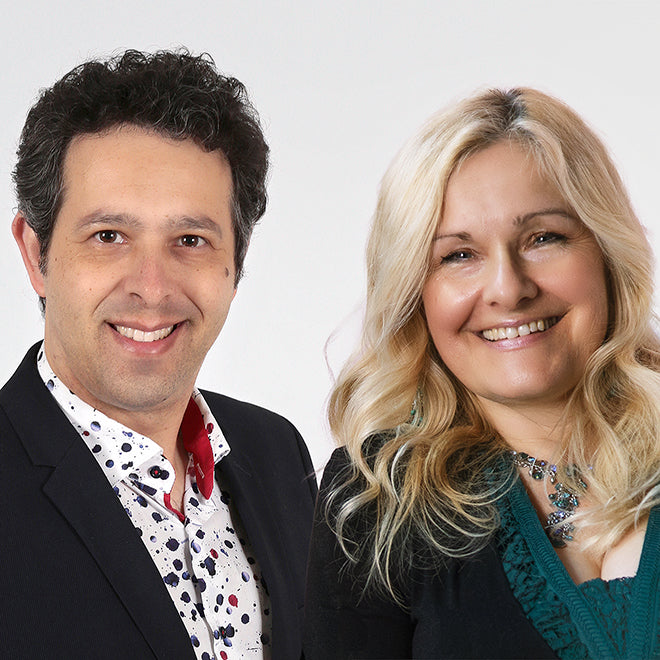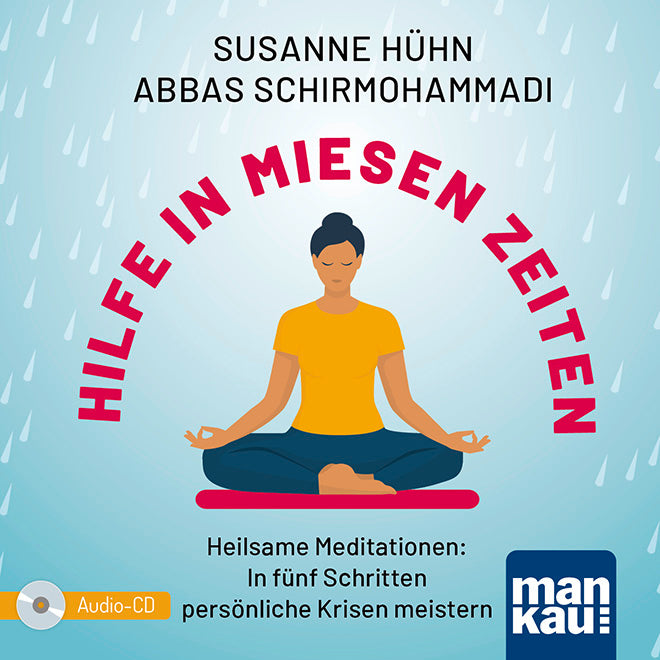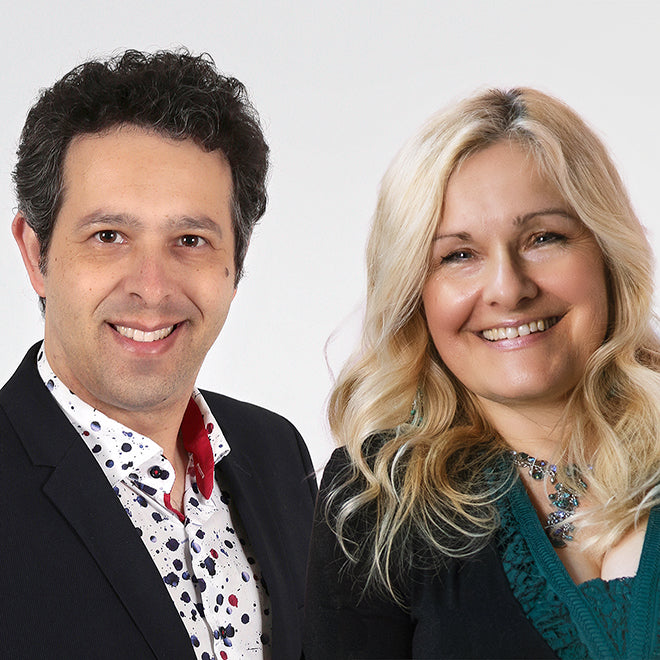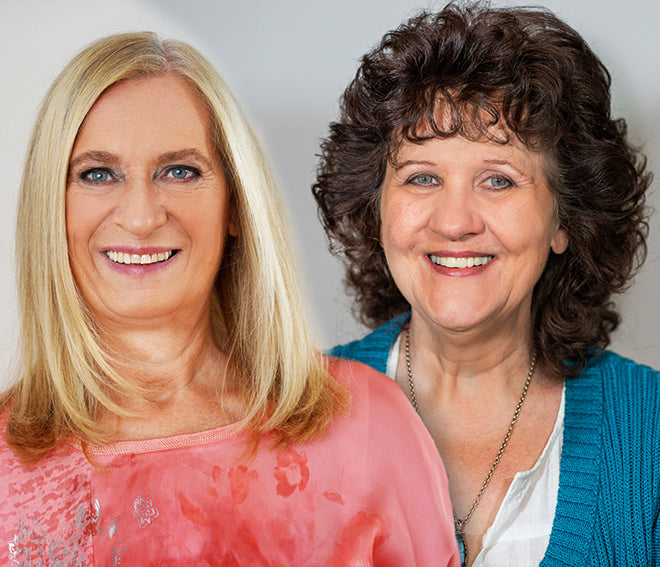
Overcoming personal crises: “'Bad times' are an opportunity to develop yourself and your own potential!” Interview with health experts Susanne Hühn and Abbas Schirmohammadi
Overcoming personal crises: “'Bad times' are an opportunity to develop yourself and your own potential!” Interview with health experts Susanne Hühn and Abbas Schirmohammadi
"Every crisis offers us the chance to mature, to recognize its deeper meaning and finally to emerge from it strengthened and clarified. The question 'Why is this happening to me, and why now?' provides us with many important clues. Our tried and tested five-step program helps us to accept, understand, deal with and overcome the crisis. On this path - which admittedly is not always easy - we gain more strength, sincerity, truthfulness and inner freedom." Susanne Hühn and Abbas Schirmohammadi , two of Germany's best known health experts, want to provide valuable assistance in times of crisis with their audio guide " Help in bad times " (also available as a download ) and explain their tried and tested five-step program in an interview.
You have both published numerous bestselling books, audio CDs and card sets, making you one of Germany's best-known health experts for almost two decades. Where do you get your motivation in difficult times like today?
Susanne: By constantly looking for the point at which we can act - even if it means consciously accepting things as they are for the moment. We can use everything that happens to develop trust that everything that happens to us makes sense on a higher level and serves to help us unfold and develop our own potential. Whether times are difficult or not is a subjective feeling; everyone has to overcome their own crises. It helps me to communicate directly with my soul. The moment I recognize the higher meaning, peace returns to me; this allows me to consciously tackle my tasks - what I have to let go of, what I have to learn, what I have to develop. Every crisis is individual and yet follows a pattern that can be resolved through five steps that we accompany in a healing, meditative way on our new audio CD "Help in bad times".
Abbas: The world as we know it has changed a lot in recent years. It has become higher, faster and wider. The smartphone is replacing interpersonal communication to an alarming extent. I see how many and more people are unhappy and are looking for help. That is why I and we have a great need to develop new concepts that can help those affected. Burying your head in the sand is never the solution. No matter how the crisis turns out, you have to get through it. That is how you grow and become stronger.
In your new audio guide you offer “ Help in bad times ” to help you overcome personal crisis situations. What do you understand by a crisis and who is your crisis management aimed at?
Susanne: A crisis is the loss of physical and/or mental balance, usually one goes hand in hand with the other. A crisis occurs when something has been wrong for a long time and all attempts to make it good, whole and healthy again have failed. Perhaps you didn't notice it, you couldn't think of anything more helpful, the rescue attempts were unsuccessful. Perhaps aggravating circumstances arose that are now robbing you of your balance. We become unable to act, we are discouraged, sad, hopeless, annoyed and angry. The existing imbalance tips over for good and we have to act. This also means that we no longer have to endure and tolerate the imbalance. Our ' Help in bad times ' is aimed at everyone who is prepared to see an opportunity in their crisis and who wants to take the question "Why is this happening to me of all people, and why now?" seriously. Searching for answers and rediscovering your own creative power within this painful and frightening situation gives meaning to the crisis. We are addressing people who are looking for this meaning and are prepared to take their own responsibility (not guilt!) in the crisis in order to mature and emerge from it strengthened and clarified.
Abbas: What we cannot do is solve the crisis for the person affected. What we can do, however, is offer them help to overcome the crisis: On the audio CD, Susanne guides you through our tried and tested five-step program with calming background music and special meditations that help you accept the crisis, understand it, work through it, reorient yourself and finally overcome it, step by step.
Through the healing meditations and guided relaxation, the listeners should learn to keep a clear mind, accept what has happened and develop their own solutions for the future. What does that look like in concrete terms and what do you have to get involved in?
Susanne: Above all, people must learn to develop self-compassion and, instead of resigning themselves or blaming themselves, to treat themselves with care and love. We don't have to accept what has happened, but we must acknowledge it as what is happening right now so that we can find new options for action and a new inner attitude from here, especially towards ourselves. Only if we are prepared to take a close look and recognize ourselves in this crisis, to treat ourselves with love and to take care of ourselves into our own hands, can we take the path to improvement. So it is a real change that we must embrace if the steps are to have an impact.
Abbas: Our program is designed so that the listener can sit or lie down comfortably, close their eyes and then go through the individual tracks meditatively. Each step contains its own content and the content builds on one another. The decisive factor is your own willingness to participate, to open up and to want to work on overcoming the crisis. This makes it possible to get through a crisis better, faster and stronger.
Many people have difficulty with meditation or inner imagery. How do you know that you are on the right path to improvement?
Susanne: If you're having a hard time, the one thing that always helps is practice. Many successful people practice a meditation method to center themselves and come into harmony with themselves. There's no getting around it. We need the willingness to try new paths, and that includes learning to get in touch with yourself. We offer empowering inner journeys that are just as suitable for those new to meditation as they are for meditation professionals. But you have to make the effort to get involved with yourself and find clarity through the inner fog, and that's what our listeners want. Everyone knows that there are no miracle pills, and who knows - maybe this crisis will help you finally learn to feel yourself.
Abbas: We all have contact with our own inner world. Some use this connection, others have deactivated it. Relaxation has numerous positive effects on our health. Therefore, everyone should treat themselves to a little break and use it to relax and recharge. The positive effects of meditation usually appear very quickly and are clearly noticeable. You notice that something is happening and quickly experience the feeling of improvement. The light at the end of the tunnel becomes brighter and stronger. This in turn motivates you to keep going.
An important part that needs to be dealt with separately because it is a big topic in its own right concerns the “inner child”. What does this mean and how do you best approach it?
Susanne: The inner child is the part of us that carries our emotional and physical needs for security, love, recognition, protection, joy and lightness. Ultimately, the inner child is a part of the brain, the limbic system. The basic needs that we had as children, we still have today as adults, and in the best case scenario, we are now the person we need. If we have really matured, then we are able to care for ourselves lovingly, compassionately and consciously. But because we have almost always learned to be there for others rather than for ourselves, because we deny or compensate for our unfulfilled and unseen emotional needs, shift them externally or suppress them, essential and vital things remain unfulfilled within us.
Abbas: You approach the inner child by first – and this is a big step! – acknowledging that you have a very needy, often ashamed and abandoned emotional being inside you that wants and needs to be seen, heard and protected. This inner being within us seeks protection, and if we do not protect it ourselves, it tends to avoid and strive to please others in order to feel safe. It is very important that we take care of this being! We either have a consciously protected and loved inner child – or one that roams around unrecognized in our inner world and fights for protection and love everywhere. But it is there, with all its unfulfilled emotional needs, and is a part of us; we should accept that. Most of the crises we experience are primarily crises of the inner child, whose carefully maintained security collapses.
In your meditation it says that the inner child longs for a safe place where it is protected and no longer alone. Where can you find this "magic garden" in a challenging everyday life marked by fear, disappointment and loss?
Susanne: If everyday life is really only characterized by fears, losses and disappointments, then it is vital to consciously take a little time out and turn to your inner child (with the help of others!). In the stress of everyday life we can usually not find it, and if we do, then only in its injured, love-seeking and self-exploiting form. We have to take the time - even if it is only for a quarter of an hour - and practice turning inward.
How did it come about that you two came together to focus on this important issue – help in difficult times?
Susanne: Abbas and I have known each other for many years. We value each other very much as colleagues and friends. In 2022, we walked a stage of the Way of St. James together; our relationship intensified further. It was clear to us that we wanted to work together and combine our accumulated knowledge in order to be able to help even more people.
Abbas: Susanne is Germany's best-known expert in inner child work. And, as already mentioned, the inner child also plays a major role in crises. I really enjoy working with her because we complement each other perfectly. Everyone brings their absolute strengths and we can rely on each other blindly. We still have a lot planned together.
Finally, what general tips can you give for living the happiest and healthiest life possible?
Susanne: In my opinion, the most important thing is to be honest with yourself, to take seriously what you feel, what you want and what you need. We must recognize that it is not selfish to look after ourselves. Most people believe that they are only lovable if they bend over backwards, but it is so important to learn to stand shoulder to shoulder with yourself and not to let yourself down in any situation, neither mentally, emotionally nor through your own actions. That sounds complex, and it is. It means that the more consciously we take responsibility for ourselves, the more consciously we focus on being happy, the happier we become. We must be prepared to leave everything that makes us unhappy behind us. There are some things that we cannot leave behind, even though they make us unhappy, but many things we can. We need our resources for what life throws at us, because that can be very hard, so we don't have to waste our time artificially getting upset and sacrificing ourselves for something we don't want. Conscious self-care in all areas of our lives, in terms of the thoughts we think and in terms of our emotional needs – that is, for me, the key to happiness.
Abbas: Everyone is responsible for their own happiness. It starts with positive thinking and a positive attitude to life. A healthy diet, regular exercise and a functioning circle of friends are other factors. Problems and conflicts should be identified, dealt with and resolved as early as possible, otherwise this backpack of problems will make life difficult for us. And of course relaxation. Whether it is autogenic training, progressive muscle relaxation, guided imagery, singing bowl relaxation, Qigong, Feldenkrais or yoga - there are many methods and all have their place. Everyone should learn a relaxation technique to relieve stress and practice it regularly, ideally daily as a routine. Even 5-10 minutes is enough. People who go through life more relaxed are also more resilient to crises, as they have more strength and resources to find solutions in bad times.
CD tip:
Susanne Hühn and Abbas Schirmohammadi: Help in bad times (audio CD) . Healing meditations: Overcoming personal crises in five steps. Mankau Verlag, 1st edition March 2024. 1 audio CD in jewel box, total running time approx. 66 minutes, 8-page booklet, €14.95 RRP € (D | A), ISBN 978-3-86374-722-0. Also available as a download
Link recommendations:
More information about the audio CD “Help in bad times”
For MP3 download at genialokal.de
More about author Susanne Hühn
More about author Abbas Schirmohammadi
Our social networks – for questions, criticism, suggestions











